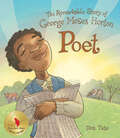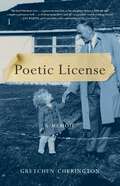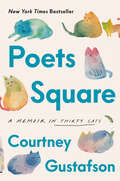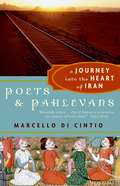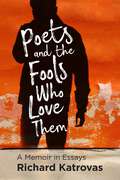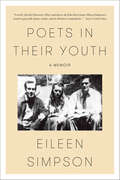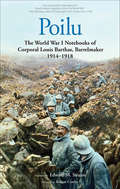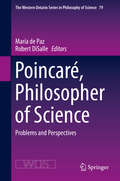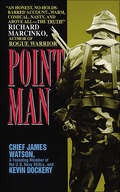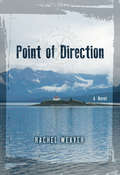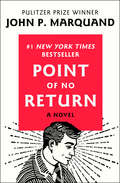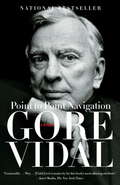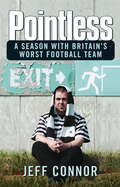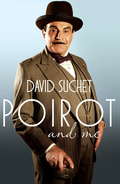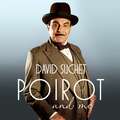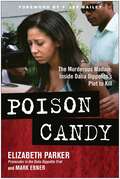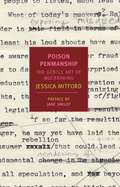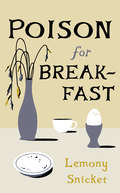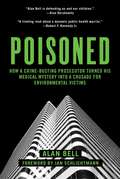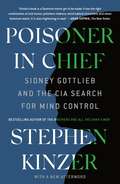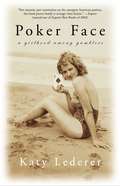- Table View
- List View
Poet: The Remarkable Story of George Moses Horton
by Don TateGeorge loved words. Enslaved and forced to work long hours, he was unable to attend school or learn how to read. But he was determined―he listened to the white children's lessons and learned the alphabet. Then he taught himself to read. Soon, he began composing poetry in his head and reciting it aloud as he sold fruits and vegetables on a nearby college campus. News of the enslaved poet traveled quickly among the students, and before long, George had customers for his poems. But George was still enslaved. Would he ever be free?Award-winning author-illustrator Don Tate tells an inspiring and moving story of talent and determination in this powerful picture book biography of George Moses Horton, the first southern Black writer to have his work published.
Poetic License: A Memoir
by Gretchen CheringtonAt age forty, with two growing children and a new consulting company she&’d recently founded, Gretchen Cherington, daughter of Pulitzer Prize–winning poet Richard Eberhart, faced a dilemma: Should she protect her parents&’ well-crafted family myths while continuing to silence her own voice? Or was it time to challenge those myths and speak her truth—even the unbearable truth that her generous and kind father had sexually violated her? In this powerful memoir, aided by her father&’s extensive archives at Dartmouth College and interviews with some of her father&’s best friends, Cherington candidly and courageously retraces her past to make sense of her father and herself. From the women&’s movement of the &’60s and the back-to-the-land movement of the &’70s to Cherington&’s consulting work through three decades with powerful executives to her eventual decision to speak publicly in the formative months of #MeToo, Poetic License is one woman&’s story of speaking truth in a world where, too often, men still call the shots.
Poets Square: A Memoir in Thirty Cats
by Courtney GustafsonNEW YORK TIMES BESTSELLER • An intimate memoir about the importance of community and care in a world that can feel impossibly broken—and a story about accidentally going viral while tending to a colony of feral cats.When Courtney Gustafson moved into a rental house in the Poets Square neighborhood of Tucson, Arizona, she didn&’t know that the property came with thirty feral cats. Focused only on her own survival—in a new relationship, during a pandemic, with poor mental health and a job that didn&’t pay enough—Courtney was reluctant to spend any of her own time or money caring for the wayward animals.But the cats—their pleading eyes, their ribs showing, the new kittens born in the driveway—didn&’t give her a choice.She had no idea about the grief and hardship of animal rescue, the staggering size of the problem in neighborhoods across the country. And she couldn&’t have imagined how that struggle—toward an ethics of care, of individuals trying their best amid spectacularly failing systems—would help pierce a personal darkness she&’d wrestled with for much of her life. She also didn&’t expect that the TikTok and Instagram accounts she created to share the quirky personalities of the wild but lovable cats, like Monkey, Goldie, Francois, and Sad Boy, would end up saving her home.Courtney writes toward a vision of connectedness, showing how taking care of the cats reshaped her understanding of empathy, resilience, and the healing power of wholly showing up for something outside yourself. She takes us from the dark alleys where she feeds feral cats to inside the tragically neglected homes where she climbs over piles of trash, and occasionally animals, and then into her own driveway with the cats she loves and must sometimes let go. Compelling and tender, Poets Square is as much about cats as it is about the urgency of care, community, and a little bit of dumb hope.
Poets and Pahlevans: A Journey into the Heart of Iran
by Marcello Di CintioMarcello Di Cintio prepares for his "journey into the heart of Iran" with the utmost diligence. He takes lessons in Farsi, researches Persian poetry and sharpens his wrestling skills by returning to the mat after a gap of some years. Knowing that there is a special relationship between heroic poetry and the various styles of traditional Persian wrestling, he sets out to discover how Iranians "reconcile creativity with combat."From the moment of his arrival in Tehran, the author is overwhelmed by hospitality. He immerses himself in male company in tea houses, conversing while smoking the qalyun or water pipe. Iranian men are only too willing to talk, especially about politics. Confusingly, he is told conflicting statements-that all Iranians love George Bush, that all Iranians hate George Bush; that life was infinitely better under the Shah, that the mullahs swept away the corruption of the Shah's regime and made life better for all.Once out of Tehran, he learns where the traditional forms of wrestling are practised. His path through the country is directed by a search for the variant disciplines and local techniques of wrestling and a need to visit sites and shrines associated with the great Persian poets: Hafez, Ferdosi, Omar Khayyám, Attar, Shahriyar and many others. Everywhere his quest leads him, he discovers that poetry is loved and quoted by everyone from taxi-drivers to students.His engagement with Iranian culture is intimate: he wrestles (sometimes reluctantly) when invited, samples illegal home-brew alcohol, attends a wedding, joins mourners, learns a new way to drink tea and attempts to observe the Ramazan fast, though not a Muslim himself. Though he has inevitable brushes with officialdom, he never feels in danger, even when he hears that a Canadian photo-journalist has apparently been beaten to death in a police cell during the author's visit. The outraged and horrified reaction of those around him to this violent act tightens the already close bond he has formed with the Persians.His greatest frustration is that he is unable to converse freely with Iranian women aware that an important part of his picture of Iran is thus absent. Yet the mosaic of incidents, encounters, vistas, conversations, atmospheres and acutely observed sights, smells and moments creates a detailed impression of a country and society that will challenge most, if not all, preconceptions.From the Hardcover edition.
Poets and the Fools Who Love Them: A Memoir in Essays
by Richard KatrovasPoets and the Fools Who Love Them blends autobiography with cultural commentary and meditates on creative writing as a cottage industry within humanities higher education. Celebrated poet and memoirist Richard Katrovas examines his picaresque early years with a criminal father, a beleaguered mother, and four siblings as state and federal authorities pursued the family across the highways of America. His freewheeling, wide-ranging essays consider, among other social constructs, the relation of crime and art, and the relation of both to the authority of the state, particularly in terms of race and class. Katrovas speaks candidly about how white privilege facilitated his father’s criminal career, as a lifestyle of larceny and used-car scams, perpetuated state to state, would have surely had different implications for a family of color. Drawing on his adulthood in academe, Katrovas’s memoir in essays chronicles a quest to locate surrogate fathers among older poets and other creative writers, and reflects upon the ways in which that search has affected his role as the father to three Czech American daughters. The book flows from the love of a poet for other poets, for the “community of poets,” one likened to a “gang of priests” and a “herd of bears.” Katrovas maintains that most lovers of poets are themselves poets, and those lovers of poets who are not themselves poets are saints.At its heart, Poets and the Fools Who Love Them contemplates, with care and unabashed honesty, the role of art and the artist in the madcap twenty-first century.
Poets in Their Youth: A Memoir
by Eileen SimpsonThis “powerful” memoir of a life among legendary poets “never sensationalizes these brilliant but wildly erratic young men, only seeks to understand them” (The Washington Post).In 1942, Eileen Simpson—then Eileen Mulligan—married John Berryman. Both were in their twenties; Eileen had just graduated from Hunter College and John had but one slim volume of poetry to his name. They moved frequently—from New York to Boston, then Princeton—chasing jobs, living simply, relying on the hospitality of more successful friends like Robert Lowell and Jean Stafford, or R.P. Blackmur and his wife, Helen. Rounding out their circle of intimates were other struggling poets like Randall Jarrell and Delmore Schwartz. Berryman alternately wrote and despaired of writing. Everyone stayed up late arguing about poetry.Poets in Their Youth is a portrait of their marriage, but it is also a portrait of a group of spectacularly intelligent friends at a particular time, in a particular place, all aflame with literature. Simpson’s recollections are so tender, her narrative so generous, it is almost possible to imagine the story has a different ending—even as Schwartz’s marriage crumbles, as Lowell succumbs to a manic episode, as her own relationship with Berryman buckles under the strain of his drinking, his infidelity, his depression.Filled with winning anecdotes and moments of startling poignancy, Simpson’s now-classic memoir shows some of the most brilliant literary minds of the second half of the twentieth century at their brightest and most achingly human, and documents “a whole doomed generation of writers, the nights of wine, dancing, and brilliant talk giving way to paranoia, envy, madness, and death” (The Times Literary Supplement).
Poilu: The World War I Notebooks of Corporal Louis Barthas, Barrelmaker, 1914 – 1918
by Louis Barthas&“An exceptionally vivid memoir of a French soldier&’s experience of the First World War.&”—Max Hastings, New York Times bestselling author Along with millions of other Frenchmen, Louis Barthas, a thirty-five-year-old barrelmaker from a small wine-growing town, was conscripted to fight the Germans in the opening days of World War I. Corporal Barthas spent the next four years in near-ceaseless combat, wherever the French army fought its fiercest battles: Artois, Flanders, Champagne, Verdun, the Somme, the Argonne. First published in France in 1978, this excellent new translation brings Barthas&’ wartime writings to English-language readers for the first time. His notebooks and letters represent the quintessential memoir of a &“poilu,&” or &“hairy one,&” as the untidy, unshaven French infantryman of the fighting trenches was familiarly known. Upon Barthas&’ return home in 1919, he painstakingly transcribed his day-to-day writings into nineteen notebooks, preserving not only his own story but also the larger story of the unnumbered soldiers who never returned. Recounting bloody battles and endless exhaustion, the deaths of comrades, the infuriating incompetence and tyranny of his own officers, Barthas also describes spontaneous acts of camaraderie between French poilus and their German foes in trenches just a few paces apart. An eloquent witness and keen observer, Barthas takes his readers directly into the heart of the Great War. &“This is clearly one of the most readable and indispensable accounts of the death of the glory of war.&”—The Daily Beast (&“Hot Reads&”)
Poincaré, Philosopher of Science
by María De Paz Robert DisalleThis volume presents a selection of papers from the Poincaré Project of the Center for the Philosophy of Science, University of Lisbon, bringing together an international group of scholars with new assessments of Henri Poincaré's philosophy of science--both its historical impact on the foundations of science and mathematics, and its relevance to contemporary philosophical inquiry. The work of Poincaré (1854-1912) extends over many fields within mathematics and mathematical physics. But his scientific work was inseparable from his groundbreaking philosophical reflections, and the scientific ferment in which he participated was inseparable from the philosophical controversies in which he played a pre-eminent part. The subsequent history of the mathematical sciences was profoundly influenced by Poincaré's philosophical analyses of the relations between and among mathematics, logic, and physics, and, more generally, the relations between formal structures and the world of experience. The papers in this collection illuminate Poincaré's place within his own historical context as well as the implications of his work for ours.
Point Last Seen
by Hannah NyalaThis is a true story about a woman who, after escaping the brutality and violence of an abusive marriage, becomes a tracker with search-and-rescue teams in the Mojave Desert.
Point Man
by James Watson Kevin DockeryA founding member of the Navy SEALs recounts the formation of that elite fighting force in this “honest, no-holds-barred” memoir of the Vietnam War (Richard Marcinko, author of Rogue Warrior).Chief Petty Officer James "Patches" Watson was there at the start. As a high-performing frogman with the famed Underwater Demolition Team 21, he was chosen to become a founding member—or a “plank owner”—of the U.S. Navy SEALs. Through three tours in the jungle hell of Vietnam, he led the way as point man—the one in charge of navigating trip wires, booby traps and punji pits. In this vividly detailed memoir, he recounts guiding his squad of amphibious fighters on missions of rescue, reconnaissance, and demolition. Together with his brave comrades, Watson confronted a war's unique terrors head-on, unprotected . . . and unafraid.This is the story of a hero told from the heart and from the gut—an authentic tour of duty with one of the most legendary commandoes of the Vietnam War.
Point Man: Inside the Toughest and Most Deadly Unit in Vietnam by a Founding Member of the Elite Navy SEALs
by James Watson Kevin DockeryChief Petty Officer James "Patches" Watson was there at the start. One of the first to come out of the famed Underwater Demolition Team 21, he was an initial member -- a "plank owner" -- of America's deadliest and most elite fighting force, the U.S. Navy SEALs. Through three tours in the jungle hell of Vietnam, he walked the point -- staying alert to trip wires, booby traps and punji pits, guiding his squad of amphibious fighters on missions of rescue, reconnaissance and demolition --confronting a war's unique terrors head-on, unprotected ... and unafraid. This is the story of a hero told from the heart and from the gut -- an authentic tour of duty with one of the most legendary commandoes of the Vietnam War.
Point of Direction
by Rachel WeaverHitchhiking her way through Alaska, a young woman named Anna is picked up by Kyle, a fisherman. Anna and Kyle quickly fall for each other, as they are both adventurous, fiercely independent, and in love with the raw beauty and solitude of Alaska. To cement their relationship, they agree to become caretakers of a remote lighthouse perched on a small rock in the middle of a deep channel-a place that has been uninhabited since the last caretaker mysteriously disappeared two decades ago. What seems the perfect adventure for these two quickly unravels, as closely-held secrets pull them apart, and the surrounding waters threaten uncertain danger. A psychological thriller set against the rugged landscape of coastal Alaska, Point of Direction is an exquisite literary debut.ction, was chosen to represent Naropa University in the Harcourt Brace Best New Voices in American Fiction contest for 2006, 2007, and 2008. Her work has been published in the Gettysburg Review, Blue Mesa Review, and the Ontario Review. She currently lives in Colorado.
Point of No Return: A Novel
by John P. MarquandConsidered by many critics to be John P. Marquand's finest novel, Point of No Return is the story of a modern businessman borne back by fate into yesteryear Raised in the small town of Clyde, Massachusetts, Charles Gray has worked long and hard to become a vice president at the privately owned Stuyvesant Bank in Manhattan. But at the most crucial moment of his career, when his focus should be on reading his boss's intentions and competing with his chief rival for the promotion, Charles finds himself hopelessly distracted by the past. Years ago, the Gray family was featured in Yankee Persepolis, a sociological study of Clyde. Charles, his sister, and their parents were classified as members of the "lower-upper class," the unspoken strains of their tenuous social status cast in stark black and white. A chance encounter with the author of the study floods Charles's thoughts with memories, and when a business matter compels him to make a trip to Clyde, it seems as if the Fates are conspiring to turn back the clock. As he reflects on the defining moments of his youth, Charles contends with one of the central mysteries of existence: how our lives can feel both predetermined and random at the same time. Published in 1949, Point of No Return is a brilliant study of character and place heralded by the New York Times as "further proof that its author is one of the most important living American novelists."
Point to Point Navigation: A Memoir, 1964 to 2006
by Gore VidalPOINT TO POINT NAVIGATION refers to a form of navigation Gore Vidal resorted to as a first mate in the navy during World War II. As he says, 'As I was writing this account of my life and times since PALIMPSEST, I felt as if I were again dealing with those capes and rocks in the Bering Sea that we had to navigate so often with a compass made inoperable by weather.' It is a beautifully apt analogy for the hazards eluded (mostly) during his eventful life. From his desks in Ravello and the Hollywood Hills, Gore Vidal travels in memory through the arenas of literature, television, film, theatre, politics, and international society, recounting achievements and defeats, friends and enemies made (and on a number of occasions lost). Among the gathering of notables to be found in these pages, Tennessee Williams, Eleanor Roosevelt, Orson Welles, Greta Garbo, and Francis Ford Coppola. Some of the book's most moving pages are devoted to the illness and death of his partner of five decades, Howard Austen, and indeed the book is, among other things, a meditation on mortality, written in the spirit of Montaigne.
Pointless
by Jeff ConnorThe inside, in-depth and indiscreet story of a season with Britain's worst football club, East Stirlingshire. The Shire are lucky if all eleven players make it to a game, they have an average home attendance at their dilapidated Firs Park ground of 200 and they ended the 2004/05 season bottom of the Scottish Third Division – for the third consecutive year. Granted access to all areas, Jeff Connor gets into the dressing room, the board room and the dug-out. But, above all, he gets into the spirit of the club. He began the season a scoffing cynic and finished it lost in admiration for one of the dottiest sporting institutions in Britain as the Shire attempted to reach the promised land; SECOND bottom of the Scottish Third Division. At times funny, sad, heart-warming and embarrassing, as events on and off the pitch unfold, Pointless is an unmissable insight into a unique football team
Pointless
by Jeff ConnorThe inside, in-depth and indiscreet story of a season with Britain's worst football club, East Stirlingshire. The Shire are lucky if all eleven players make it to a game, they have an average home attendance at their dilapidated Firs Park ground of 200 and they ended the 2004/05 season bottom of the Scottish Third Division – for the third consecutive year. Granted access to all areas, Jeff Connor gets into the dressing room, the board room and the dug-out. But, above all, he gets into the spirit of the club. He began the season a scoffing cynic and finished it lost in admiration for one of the dottiest sporting institutions in Britain as the Shire attempted to reach the promised land; SECOND bottom of the Scottish Third Division. At times funny, sad, heart-warming and embarrassing, as events on and off the pitch unfold, Pointless is an unmissable insight into a unique football team
Poirot and Me
by David SuchetFans of Murder on the Orient Express and all things Agatha Christie won't want to miss this charming memoir from David Suchet...In the summer of 2013 David Suchet filmed his final scenes as Hercule Poirot. After 24 years in the role, he played the character in every story that Agatha Christie wrote about him (bar one, deemed unfilmable) and felt it time to bid adieu to a role and a character that changed his life.In Poirot and Me, David Suchet tells the story of how he secured the part, with the blessing of Agatha Christie's daughter, and set himself the task of presenting the most authentic Poirot that had ever been filmed.David Suchet is uniquely placed to write the ultimate companion to one of the world's longest running television series. Peppered with anecdotes about filming, including many tales of the guest stars who have appeared over the years, the book is essential reading for Poirot fans all over the world.
Poirot and Me
by David SuchetFans of Murder on the Orient Express and all things Agatha Christie won't want to miss this charming memoir from David Suchet...In the summer of 2013 David Suchet filmed his final scenes as Hercule Poirot. After 24 years in the role, he played the character in every story that Agatha Christie wrote about him (bar one, deemed unfilmable) and felt it time to bid adieu to a role and a character that changed his life.In Poirot and Me, David Suchet tells the story of how he secured the part, with the blessing of Agatha Christie's daughter, and set himself the task of presenting the most authentic Poirot that had ever been filmed.David Suchet is uniquely placed to write the ultimate companion to one of the world's longest running television series. Peppered with anecdotes about filming, including many tales of the guest stars who have appeared over the years, the book is essential reading for Poirot fans all over the world.
Poirot and Me
by David SuchetIn the summer of 2013 David Suchet will film his final scenes as Hercule Poirot. After 24 years in the role, he will have played the character in every story that Agatha Christie wrote about him (bar one, deemed unfilmable) and he will bid adieu to a role and a character that have changed his life.In Poirot and Me, David Suchet tells the story of how he secured the part, with the blessing of Agatha Christie's daughter, and set himself the task of presenting the most authentic Poirot that had ever been filmed.David Suchet is uniquely placed to write the ultimate companion to one of the world's longest running television series. Peppered with anecdotes about filming, including many tales of the guest stars who have appeared over the years, the book is essential reading for Poirot fans all over the world.(P)2013 Headline Digital
Poison Candy: The Murderous Madam: Inside Dalia Dippolito's Plot to Kill
by Mark Ebner Elizabeth ParkerIn August 2009, former madam Dalia Dippolito conspired with a hit man to arrange her ex-con husband's murder. Days later, it seemed as if all had gone according to plan. The beautiful, young Dalia came home from her health club to an elaborate crime scene, complete with yellow tape outlining her townhome and police milling about. When Sgt. Frank Ranzie of the Boynton Beach, Florida, police informed her of her husband Michael's apparent murder, the newlywed Dippolito can be seen on surveillance video collapsing into the cop's arms, like any loving wife would—or any wife who was pretending to be loving would. The only thing missing from her performance were actual tears. ... And the only thing missing from the murder scene was an actual murder. Tipped off by one of Dalia's lovers, an undercover detective posing as a hit man met with Dalia to plot her husband's murder while his team planned, then staged the murder scenario—brazenly inviting the reality TV show Cops along for the ride. The Cops video went viral, sparking a media frenzy: twisted tales of illicit drugs, secret boyfriends, sex-for-hire, a cuckolded former con man, and the defense's ludicrous claim that the entire hit had been staged by the intended victim for reality TV fame. In Poison Candy, case prosecutor Elizabeth Parker teams with bestselling crime writer Mark Ebner take you behind and beyond the courtroom scenes with astonishing never-before-revealed facts, whipsaw plot twists, and exclusive photos and details far too lurid for the trial that led to 20 years in state prison for Dalia Dippolito.
Poison Penmanship: The Gentle Art of Muckraking
by Jessica Mitford Jane SmileyJessica Mitford was a member of one of England's most legendary families (among her sisters were the novelist Nancy Mitford and the current Duchess of Devonshire) and one of the great muckraking journalists of modern times. Leaving England for America, she pursued a career as an investigative reporter and unrepentant gadfly, publicizing not only the misdeeds of, most famously, the funeral business (The American Way of Death, a bestseller) and the prison business (Kind and Usual Punishment), but also of writing schools and weight-loss programs. Mitford's diligence, unfailing skepticism, and acid pen made her one of the great chroniclers of the mischief people get up to in the pursuit of profit and the name of good. Poison Penmanship collects seventeen of Mitford's finest pieces--about everything from crummy spas to network-TV censorship--and fills them out with the story of how she got the scoop and, no less fascinating, how the story developed after publication. The book is a delight to read: few journalists have ever been as funny as Mitford, or as gifted at getting around in those dark, cobwebbed corners where modern America fashions its shiny promises. It's also an unequaled and necessary manual of the fine art of investigative reporting.
Poison for Breakfast
by Lemony SnicketWashington Post Bestseller A new stand-alone adventure—appropriate for all ages—by Lemony Snicket, one of the twenty-first century’s most beloved authors. In the years since this publishing house was founded, we have worked with an array of wondrous authors who have brought illuminating clarity to our bewildering world. Now, instead, we bring you Lemony Snicket. Over the course of his long and suspicious career, Mr. Snicket has investigated many things, including villainy, treachery, conspiracy, ennui, and various suspicious fires. In this book, he is investigating his own death. Poison for Breakfast is a different sort of book than others we have published, and from others you may have read. It is different from other books Mr. Snicket has written. It could be said to be a book of philosophy, something almost no one likes, but it is also a mystery, and many people claim to like those. Certainly Mr. Snicket didn’t relish the dreadful task of solving it, but he had no choice. It was put in front of him, right there, on his plate.
Poisoned: How a Crime-Busting Prosecutor Turned His Medical Mystery into a Crusade for Environmental Victims
by Alan Bell Jan SchlichtmannAfter years of prosecuting hard-core criminals, rising legal star Alan Bell took a private sector job in South Florida’s newest skyscraper. Suddenly, he suffered such bizarre medical symptoms, doctors suspected he’d been poisoned by the Mafia. Bell’s rapidly declining health forced him to flee his glamorous Miami life to a sterile “bubble” in the remote Arizona desert. As his career and marriage dissolved, Bell pursued medical treatments in a race against time, hoping to stay alive and raise his young daughter, his one desperate reason to keep going. He eventually discovered he wasn’t poisoned by a criminal, but by his office building. His search for a cure led him to discover the horrifying truth: his tragedy was just the tip of the iceberg. Millions of people fall ill and die each year because of toxic chemical exposures—without knowing they’re at risk. Stunned by what he discovered, Bell chose to fight back, turning his plight into an opportunity. Despite his precarious health, he began collaborating with scientists dedicated to raising awareness about this issue. Soon, he also found himself drawn back into the legal field, teaming up with top lawyers fighting for those who had already fallen ill. Both a riveting medical mystery and a cautionary tale, this book puts a human face on the hidden truths behind toxic dangers assaulting us in our everyday environments—and offers practical ways to protect ourselves and our children.
Poisoner in Chief: Sidney Gottlieb and the CIA Search for Mind Control
by Stephen KinzerThe bestselling author of All the Shah’s Men and The Brothers tells the astonishing story of the man who oversaw the CIA’s secret drug and mind-control experiments of the 1950s and ’60s.The visionary chemist Sidney Gottlieb was the CIA’s master magician and gentlehearted torturer—the agency’s “poisoner in chief.” As head of the MK-ULTRA mind control project, he directed brutal experiments at secret prisons on three continents. He made pills, powders, and potions that could kill or maim without a trace—including some intended for Fidel Castro and other foreign leaders. He paid prostitutes to lure clients to CIA-run bordellos, where they were secretly dosed with mind-altering drugs. His experiments spread LSD across the United States, making him a hidden godfather of the 1960s counterculture. For years he was the chief supplier of spy tools used by CIA officers around the world.Stephen Kinzer, author of groundbreaking books about U.S. clandestine operations, draws on new documentary research and original interviews to bring to life one of the most powerful unknown Americans of the twentieth century. Gottlieb’s reckless experiments on “expendable” human subjects destroyed many lives, yet he considered himself deeply spiritual. He lived in a remote cabin without running water, meditated, and rose before dawn to milk his goats.During his twenty-two years at the CIA, Gottlieb worked in the deepest secrecy. Only since his death has it become possible to piece together his astonishing career at the intersection of extreme science and covert action. Poisoner in Chief reveals him as a clandestine conjurer on an epic scale.
Poker Face: A Girlhood Among Gamblers
by Katy Lederer"The intricacies of family and the complexities of the games they play mingle wonderfully here in a memoir quite unlike any other."--George Plimpton, author of Truman Capote. Katy Lederer grew up on the bucolic campus of an exclusive East Coast boarding school where her father taught English, her mother retreated into crosswords and scotch, and her much older siblings played "grown-up" games like gin rummy and chess. But Katy faced much more than the typical trials of childhood. Within the confines of the Lederer household an unlikely transformation was brewing, one that would turn this darkly intellectual and game-happy group into a family of professional gamblers. Poker Face is Katy Lederer's perceptive account of her family's lively history. From the long kitchen table where her mother played what seemed an endless game of solitaire, to the seedy New York bars where her brother first learned to play poker, to the glamorous Bellagio casino in Las Vegas, where her sister and brother wager hundreds of thousands of dollars a night at the tables, Lederer takes us on a tragicomic journey through a world where intelligence and deceit are used equally as currency. Not since Mary McCarthy's Memories of a Catholic Girlhood has a writer cast such a witty and astringently analytic eye on the demands of growing up. An unflinching exploration of trust and betrayal, competition, suspicion, and unconventional familial love,Poker Face is a testament to the human spirit's inventiveness when faced with unusually difficult odds.
